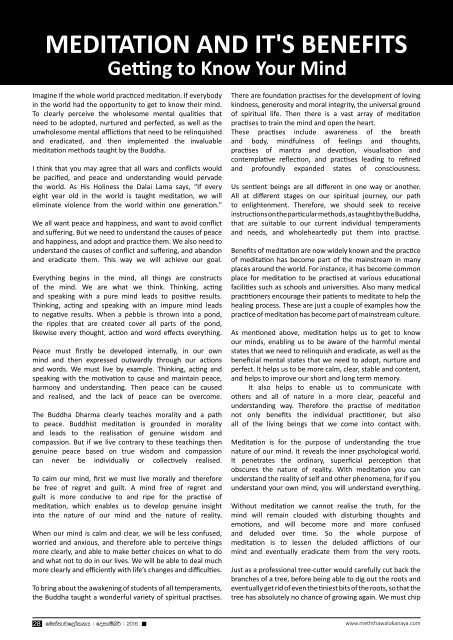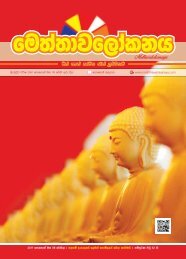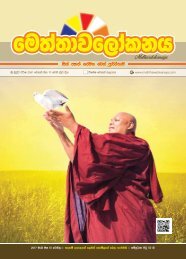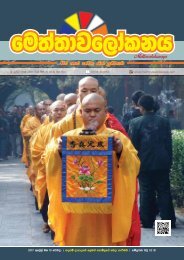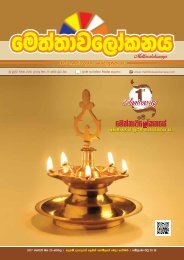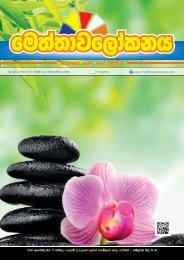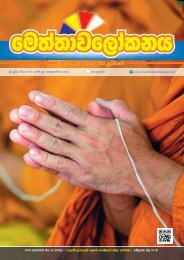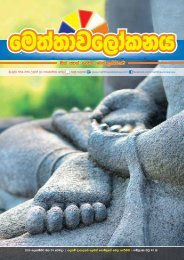Mettavalokanaya Buddhist Magazine - December 13 2016
Sri Lankan most popular & leading Buddhist Magazine “Mettavalokanaya” Buddhist Magazine - December 13 2016
Sri Lankan most popular & leading Buddhist Magazine “Mettavalokanaya” Buddhist Magazine - December 13 2016
Create successful ePaper yourself
Turn your PDF publications into a flip-book with our unique Google optimized e-Paper software.
MEDITATION AND IT'S BENEFITS<br />
Getting to Know Your Mind<br />
Imagine if the whole world practiced meditation. If everybody<br />
in the world had the opportunity to get to know their mind.<br />
To clearly perceive the wholesome mental qualities that<br />
need to be adopted, nurtured and perfected, as well as the<br />
unwholesome mental afflictions that need to be relinquished<br />
and eradicated, and then implemented the invaluable<br />
meditation methods taught by the Buddha.<br />
I think that you may agree that all wars and conflicts would<br />
be pacified, and peace and understanding would pervade<br />
the world. As His Holiness the Dalai Lama says, “If every<br />
eight year old in the world is taught meditation, we will<br />
eliminate violence from the world within one generation."<br />
We all want peace and happiness, and want to avoid conflict<br />
and suffering. But we need to understand the causes of peace<br />
and happiness, and adopt and practice them. We also need to<br />
understand the causes of conflict and suffering, and abandon<br />
and eradicate them. This way we will achieve our goal.<br />
Everything begins in the mind, all things are constructs<br />
of the mind. We are what we think. Thinking, acting<br />
and speaking with a pure mind leads to positive results.<br />
Thinking, acting and speaking with an impure mind leads<br />
to negative results. When a pebble is thrown into a pond,<br />
the ripples that are created cover all parts of the pond,<br />
likewise every thought, action and word effects everything.<br />
Peace must firstly be developed internally, in our own<br />
mind and then expressed outwardly through our actions<br />
and words. We must live by example. Thinking, acting and<br />
speaking with the motivation to cause and maintain peace,<br />
harmony and understanding. Then peace can be caused<br />
and realised, and the lack of peace can be overcome.<br />
The Buddha Dharma clearly teaches morality and a path<br />
to peace. <strong>Buddhist</strong> meditation is grounded in morality<br />
and leads to the realisation of genuine wisdom and<br />
compassion. But if we live contrary to these teachings then<br />
genuine peace based on true wisdom and compassion<br />
can never be individually or collectively realised.<br />
To calm our mind, first we must live morally and therefore<br />
be free of regret and guilt. A mind free of regret and<br />
guilt is more conducive to and ripe for the practise of<br />
meditation, which enables us to develop genuine insight<br />
into the nature of our mind and the nature of reality.<br />
When our mind is calm and clear, we will be less confused,<br />
worried and anxious, and therefore able to perceive things<br />
more clearly, and able to make better choices on what to do<br />
and what not to do in our lives. We will be able to deal much<br />
more clearly and efficiently with life’s changes and difficulties.<br />
To bring about the awakening of students of all temperaments,<br />
the Buddha taught a wonderful variety of spiritual practises.<br />
There are foundation practises for the development of loving<br />
kindness, generosity and moral integrity, the universal ground<br />
of spiritual life. Then there is a vast array of meditation<br />
practises to train the mind and open the heart.<br />
These practises include awareness of the breath<br />
and body, mindfulness of feelings and thoughts,<br />
practises of mantra and devotion, visualisation and<br />
contemplative reflection, and practises leading to refined<br />
and profoundly expanded states of consciousness.<br />
Us sentient beings are all different in one way or another.<br />
All at different stages on our spiritual journey, our path<br />
to enlightenment. Therefore, we should seek to receive<br />
instructions on the particular methods, as taught by the Buddha,<br />
that are suitable to our current individual temperaments<br />
and needs, and wholeheartedly put them into practise.<br />
Benefits of meditation are now widely known and the practice<br />
of meditation has become part of the mainstream in many<br />
places around the world. For instance, it has become common<br />
place for meditation to be practised at various educational<br />
facilities such as schools and universities. Also many medical<br />
practitioners encourage their patients to meditate to help the<br />
healing process. These are just a couple of examples how the<br />
practice of meditation has become part of mainstream culture.<br />
As mentioned above, meditation helps us to get to know<br />
our minds, enabling us to be aware of the harmful mental<br />
states that we need to relinquish and eradicate, as well as the<br />
beneficial mental states that we need to adopt, nurture and<br />
perfect. It helps us to be more calm, clear, stable and content,<br />
and helps to improve our short and long term memory.<br />
It also helps to enable us to communicate with<br />
others and all of nature in a more clear, peaceful and<br />
understanding way. Therefore the practise of meditation<br />
not only benefits the individual practitioner, but also<br />
all of the living beings that we come into contact with.<br />
Meditation is for the purpose of understanding the true<br />
nature of our mind. It reveals the inner psychological world.<br />
It penetrates the ordinary, superficial perception that<br />
obscures the nature of reality. With meditation you can<br />
understand the reality of self and other phenomena, for if you<br />
understand your own mind, you will understand everything.<br />
Without meditation we cannot realise the truth, for the<br />
mind will remain clouded with disturbing thoughts and<br />
emotions, and will become more and more confused<br />
and deluded over time. So the whole purpose of<br />
meditation is to lessen the deluded afflictions of our<br />
mind and eventually eradicate them from the very roots.<br />
Just as a professional tree-cutter would carefully cut back the<br />
branches of a tree, before being able to dig out the roots and<br />
eventually get rid of even the tiniest bits of the roots, so that the<br />
tree has absolutely no chance of growing again. We must chip<br />
28 fu;a;djf,dalkh I foieïn¾ I <strong>2016</strong><br />
www.meththawalokanaya.com


